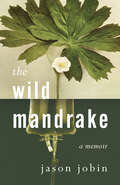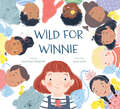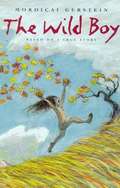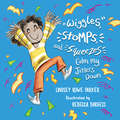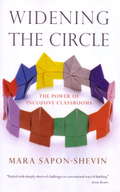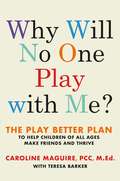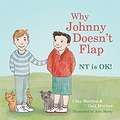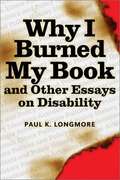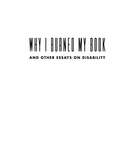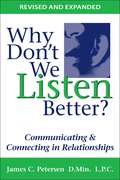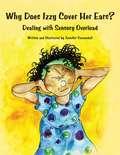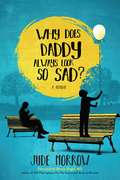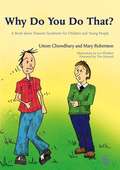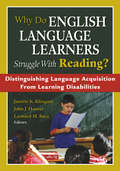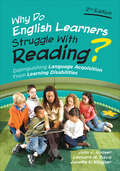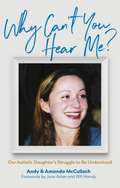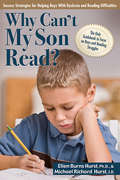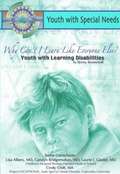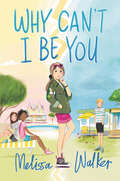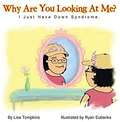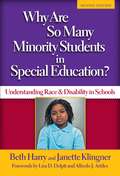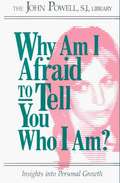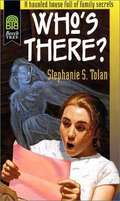- Table View
- List View
The Wild Mandrake: A Memoir
by Jason JobinOn the cusp of adulthood, a young writer’s life is stalled as he faces cancer that keeps coming back.Doctors used to tell him he was cured. That was a long time ago. Ever since he first left home at age nineteen, writer Jason Jobin has had cancer. Every five years, like clockwork, it relapses, and yet he always pulls through, surrounded by friends and family but isolated by illness. Chemotherapy, surgeries, radiation — these persist, but they aren’t the milestones of his life. They can’t be, he won’t let them be.From helicoptering into the Yukon backcountry to teaching in an elite writing program, Jason strives to enter adulthood with some normalcy, but his is the life of “a special case.” And he does live. He lives working at a deli for minimum wage as his students come down the hill to shop and ask what he’s doing there. He lives measuring out nausea pills and benzos while his roommates drink and smoke and party. He lives lying to girlfriends about past diagnoses because what can you say? What do you build on rubble? He lives high and low and in between. Again he is sick, again he is cured. It’s miraculous. A great gift. But never enough.Told in short glimpses, this story redefines what it means to survive. Jobin brings together the illuminated moments of loss and joy as he navigates chronic illness and builds from it something new and wildly unexpected.
The Wild Horse Who Loved the Girl
by Jennifer HustisBest known for her paintings of horses, artist Jennifer Cocoma Hustis takes us into the mind of a rescue horse to tell us the story of his growing relationship with a young girl who trains and bonds with him. The quietly touching story Hustis has to tell, based on the experience of her own daughter, is accompanied by the artist’s simplifi ed and understated, yet highly evocative, illustrations of scenes from the book. The book is one that should make readers of any age understand the artist’s dedication to “the animals who make us better people.” — by John Brandenburg, artist and arts correspondent for The Oklahoman
Wild for Winnie
by Laura Marx FitzgeraldNew student Winnie has sensory processing challenges, but her wonderful teacher knows just how to make sure she's a welcome part of the class.Winnie is the new kid at school, and sometimes she acts kind of wild. Her teacher says to her classmates, "Maybe Winnie feels the world differently than most of us. Why don't we give her world a try?" So that week, when Winnie can't stop monkeying around, the class joins her on the jungle gym. And when she's acting squirrelly, they all go nuts on an obstacle course. When Winnie is being a bit of a bear, the whole class burrows into a cozy den for storytime. Soon, with the guidance of their loving teacher, Winnie's classmates realize that sometimes we all feel the world differently, and that's more than okay.
The Wild Boy
by Mordicai GersteinThis book is based on the true story of the Wild Boy of Aveyron. When hunters found him, this boy had known no human contact. With the help of a dedicated young doctor and his loving housekeeper, he learns to feel, to care, to appreciate soft things. Regretfully, he never learns to talk. Gerstein tells the story with charm and respect. This would be a fine choice for a book report.
Wiggles, Stomps, and Squeezes Calm My Jitters Down
by Lindsey Rowe ParkerThis is a story about sensory differences and how some children experience their world, told from a child's perspective.The vibration in her feet when she runs, the tap-tap-tap of her fork on the table at mealtime, the trickle of cool water running over her hands---these are the things that calm her jitters down. This book is for anyone who has ever felt the need for a wiggle,s tomp, or squeeze!Wiggles, Stomps, and Squeezes playfully validates the unique sensory experiences of children, written from their own perspective. I'm excited for every kid that will see themselves in this beautiful book!" - Mark Loewen, Author of What Does a Princess Really Look Like?"I have worked in special education for 12 years and have not ccome across a book that explains these jittery feelings until now. This book will capture the hearts of families and children with unique needs as well as educate those unfamiliar with sensory differences." - Bridget Martinez, Special Education Teacher "I often find myself trying to explain to parents why their child needs wiggles, stomps, and squeezes to get through their day while experiencing sensory input in ways that are different and often more intense. This is the first book I have come across that provides a very real glimpse into the lived experience of a child with sensory differences. What a wonderful book that so many families can benefit from!? - Caitlyn Berry, Occupational Therapist
Widening the Circle: The Power of Inclusive Classrooms
by Mara Sapon-ShevinWidening the Circle is a passionate, even radical argument for creating school and classroom environments where all kids, including children labeled as "disabled" and "special needs," are welcome on equal terms. In opposition to traditional models of special education, where teachers decide when a child is deemed "ready to compete" in "mainstream" classes, Mara Sapon-Shevin articulates a vision of full inclusion as a practical and moral goal. Inclusion, she argues, begins not with the assumption that students have to earn their way into the classroom with their behavior or skills, it begins with the right of every child to be in the mainstream of education, perhaps with modifications, adaptations, and support. Full inclusion requires teachers to think about all aspects of their classrooms-pedagogy, curriculum, and classroom climate. Crucially, Sapon-Shevin takes on arguments against full inclusion in a section of straight-talking answers to common questions. She agrees with critics that the rhetoric of inclusion has been used to justify eliminating services and "dumping" students with significant educational needs unceremoniously back into the mainstream with little or no support. If full inclusion is properly implemented, however, she argues, it not only clearly benefits those traditionally excluded but enhances the educations and lives of those considered mainstream in myriad ways. Through powerful storytelling and argument, Sapon-Shevin lays out the moral and educational case for not separating kids on the basis of difference.
Why Will No One Play with Me?: The Play Better Plan to Help Children of All Ages Make Friends and Thrive
by Caroline MaguireFrom renowned parent expert Caroline Maguire, Why Will No One Play with Me? is a groundbreaking program that has helped thousands of children struggling with social skills to make friends, find acceptance, and have a happy childhood. Every parent wants their child to be okay--to have friends, to be successful, to feel comfortable in his or her own skin. But many children lack important social and executive functioning skills that allow them to navigate through the world with ease. In-demand parenting expert and former Hallowell Center coach Caroline Maguire has worked with thousands of families dealing with chronic social dilemmas, ranging from shyness to aggression to ADHD, and more. In this groundbreaking book, she shares her decade-in-the-making protocol--The Play Better Plan-- to help parents coach children to connect with others and make friends. Children of all ages--truly, from Kindergarten to college age-- will gain the confidence to make friends and get along with others, using tools such as:*Social Sleuthing: learn to pay attention to social cues*Post-Play Date Huddles: help kids figure out what to look for in a friendship*Reflective Listening: improve your child's relationship with their peersWith compassion and ease, this program gives parents a tangible, easy-to-follow guide for helping kids develop the executive function and social skills they need to thrive.
Why Johnny Doesn't Flap: NT Is Ok!
by Clay Morton & Gail MortonJohnny is different. He is never exactly on time, he can't seem to stick to a routine and he often speaks in cryptic idioms. Johnny is neurotypical, but that's OK. A picture book with a difference, Why Johnny Doesn't Flap turns the tables on common depictions of neurological difference by drolly revealing how people who are not on the autistic spectrum are perceived by those who are. The autistic narrator's bafflement at his neurotypical friend's quirks shows that 'normal' is simply a matter of perspective.
Why I Burned My Book And Other Essays On Disability
by Paul K. Longmore<P>This wide-ranging book shows why Paul Longmore is one of the most respected figures in disability studies today. Understanding disability as a major variety of human experience, he urges us to establish it as a category of social, political, and historical analysis in much the same way that race, gender, and class already have been. The essays here search for the often hidden pattern of systemic prejudice and probe into the institutionalized discrimination that affects the one in five Americans with disabilities. <P>Whether writing about the social critic Randolph Bourne, contemporary political activists, or media representations of people with disabilities, Longmore demonstrates that the search for heroes is a key part of the continuing struggle of disabled people to gain a voice and to shape their destinies. His essays on bioethics and public policy examine the conflict of agendas between disability rights activists and non-disabled policy makers, healthcare professionals, euthanasia advocates, and corporate medical bureaucracies. <P> The title essay, which concludes the book, demonstrates the necessity of activism for any disabled person who wants access to the American dream. <P> Author note: Paul K. Longmore is Professor of History at San Francisco State University. He is the author of The Invention of George Washington and the co-editor (with Lauri Umansky) of The New Disability History: American Perspectives.
Why I Burned My Book: And Other Essays on Disability
by Paul K. LongmoreThis wide-ranging book shows why Paul Longmore is one of the most respected figures in disability studies today. Understanding disability as a major variety of human experience, he urges us to establish it as a category of social, political, and historical analysis in much the same way that race, gender, and class already have been. The essays here search for the often hidden pattern of systemic prejudice and probe into the institutionalized discrimination that affects the one in five Americans with disabilities. Whether writing about the social critic Randolph Bourne, contemporary political activists, or media representations of people with disabilities, Longmore demonstrates that the search for heroes is a key part of the continuing struggle of disabled people to gain a voice and to shape their destinies. His essays on bioethics and public policy examine the conflict of agendas between disability rights activists and non-disabled policy makers, healthcare professionals, euthanasia advocates, and corporate medical bureaucracies. The title essay, which concludes the book, demonstrates the necessity of activism for any disabled person who wants access to the American dream.
Why Don't We Listen Better?: Communicating and Connecting in Relationships
by James PetersenGood communication uses the same skills in a professional office, on a date, in a corporate board room, or at a kitchen table, says Dr. Jim Petersen, author of Why Don't We Listen Better? He wrote this book to help you gain these skills and improve your relationships. According to this veteran counselor, most of us think we listen well, but don't. Not really hearing what others are trying to say can be costly. When people don't feel heard they tend to get irritated, confused, and pull away from each other. You will chuckle in recognition of his flat-brain theory. It shows why we have trouble hearing each other and what we can do about it. Jim's insights and collection of listening techniques will give you creative ways to handle both daily interactions and difficult relationshipsUsing the portable Talker-Listener Card will help you and others hear each other, relax, think clearer, and build empathy and cooperation. This unique approach to listening could change your life.
Why Does Izzy Cover Her Ears? Dealing With Sensory Overload
by Jennifer VeenendallAn illustrated book that creates an environment that is accepting of students with sensory modulation difficulties, including many on the autism spectrum. It includes definitions of sensory processing and sensory modulation disorder, suggested discussion questions, and lists of related books and websites.
Why Does Daddy Always Look So Sad?
by Jude MorrowWhy Does Daddy Always Look So Sad? is a poignant and honest memoir detailing Jude Morrow&’s journey to parenthood, and how his autism profoundly affected that journey, for both better and worse, bringing hope to all who live with autism as well as those who care for someone on the spectrum.I knew that Jupiter has seventy-nine known moons and where the swimming pool was located on the Titanic, yet I didn&’t know how to connect with this beautiful child who called me &“Daddy.&” Why Does Daddy Always Look So Sad? is a candid view of life and love through the eyes of an autistic adult—who went from being a nonverbal and aggressive child to a hard working and responsible father to a non-autistic son. Growing up autistic, Jude Morrow faced immense challenges and marginalization, but he was able to successfully—though not without difficulty—finish university and transition into a successful career and eventually parenthood. Those with autism can have difficulty understanding the world around them and can find it hard to find their voice, but in this poignant and honest memoir, Jude defiantly uses his found voice to break down the misconceptions and societal beliefs surrounding autism, bringing hope to all who live with autism as well as those who care for someone on the spectrum. Jude views his autism as a gift to be shared, not a burden to be pitied, and as he demonstrates through his honest recollections and observations, autistic people&’s lives can be every bit as happy and fulfilling as those not on the spectrum.
Why Do You Do That?: A Book about Tourette Syndrome for Children and Young People
by Mary Robertson Uttom ChowdhuryWritten specifically for siblings of children with Tourette Syndrome (TS), Why Do You Do That? is an age-appropriate source of information for children and adolescents aged 8 to 16. Uttom Chowdhury and Mary Robertson describe tics and Tourette's in clear, child-friendly terms and provide a simple explanation of the biological causes. Other chapters focus on living with someone who has TS, associated features such as obsessive-compulsive disorder, attention deficit/hyperactivity disorder and aggression, and what siblings can do to help. The authors also offer practical tips on how to deal with issues such as problems at school and bullying. This book will prove invaluable for brothers and sisters of children with TS, as well as parents and other family members.
Why Do English Learners Struggle With Reading?: Distinguishing Language Acquisition From Learning Disabilities
by John J. Hoover Leonard M. Baca Janette Kettmann KlingnerMake the right instructional and eligibility decisions to help your English Learners! Do your students' reading difficulties reflect language acquisition issues or a learning disability? Now in an updated second edition, this essential guide helps educators make informed choices about strategies and services to support English Learners, and includes: Nine common misconceptions that can lead to wrongful placement of students in Special Education A new chapter on evidence-based practices for success in teaching reading to students learning English Appropriate techniques to use when assessing students for special education Expanded coverage of Response to Intervention to include a multi-tiered system of supports (MTSS)
Why Do English Learners Struggle With Reading?: Distinguishing Language Acquisition From Learning Disabilities
by John J. Hoover Leonard M. Baca Janette Kettmann KlingnerMake the right instructional and eligibility decisions to help your English Learners! Do your students' reading difficulties reflect language acquisition issues or a learning disability? Now in an updated second edition, this essential guide helps educators make informed choices about strategies and services to support English Learners, and includes: Nine common misconceptions that can lead to wrongful placement of students in Special Education A new chapter on evidence-based practices for success in teaching reading to students learning English Appropriate techniques to use when assessing students for special education Expanded coverage of Response to Intervention to include a multi-tiered system of supports (MTSS)
Why Do English Learners Struggle With Reading?: Distinguishing Language Acquisition From Learning Disabilities
by John J. Hoover Leonard M. Baca Janette Kettmann KlingnerMake the right instructional and eligibility decisions to help your English Learners! Do your students' reading difficulties reflect language acquisition issues or a learning disability? Now in an updated second edition, this essential guide helps educators make informed choices about strategies and services to support English Learners, and includes: Nine common misconceptions that can lead to wrongful placement of students in Special Education A new chapter on evidence-based practices for success in teaching reading to students learning English Appropriate techniques to use when assessing students for special education Expanded coverage of Response to Intervention to include a multi-tiered system of supports (MTSS)
Why Can’t You Hear Me?: Our Autistic Daughter’s Struggle to Be Understood
by Andrew McCulloch Amanda McCullochIn the early hours of 28th July 2016, Colette McCulloch was hit by a lorry and killed on the A1. Eighteen hours earlier she had walked out of the specialist care facility for autistic adults where she was being treated. Here, Andy and Amanda McCulloch tell the story of their daughter's life and untimely death: the years in which her autism went undiagnosed, her lifelong battle with eating disorders and the lack of support for her complex needs. The book is interspersed with Colette's own vivid and eloquent writing, her poetry and prose articulating her experiences grappling with a world forever at odds with her. Colette's story is a call to action and ultimately leaves a message of hope for a future in which autistic people will be better understood and able to flourish.
Why Can't My Son Read?
by Ellen Burns Hurst Michael Richard HurstWhy Can't My Son Read? offers a practical view of dyslexia written for parents of boys who struggle with reading. Boys are kept back in schools at twice the rate of girls, they get expelled from preschool nearly five times more often than girls, they are diagnosed with learning disorders and attention problems at nearly four times the rate of girls, and they do less homework and get a greater proportion of low grades. This book will teach parents the components of the reading process, along with exploring the intersection of reading, attention, and executive functions. The importance of competition and active engagement for boys with dyslexia is dissected by looking at both sides of the competition debate. Specific checklists and guidelines to support boys' reading improvement are provided, and an additional chapter is included for parents seeking special education services for their sons, with "tricks of the trade" to get and keep the process moving.
Why Can't I Learn like Everyone Else? Youth with Learning Disabilities (Youth with Special Needs)
by Shirley BrinkerhoffWhen Charlie Begay starts first grade, he soon discovers that he simply cannot learn to read the way the other students do. Unable to understand why, he comes up with this explanation: "There's something wrong with my brain." Convinced that he is "dumb," Charlie goes about solving his problem in the only way he knows how, by "bartering" with his friend Jake: Charlie teaches Jake to skateboard, and in return, Jake reads their homework aloud and writes out Charlie's assignments for him. Their arrangement continues well into seventh grade. Then Charlie's father marries a woman who has a learning disability herself, and everything about Charlie's life begins to change. Millions of students today struggle with learning disabilities like dyslexia, dyscalculia, and dysgraphia. Yet many of these students have little or no idea why learning is so difficult and frustrating for them, that they have a learning disability, or that help is available. Instead, many students who struggle with learning decide they are unintelligent and give up on education. Up to 40 percent of young people with learning disabilities even decide to quit high school. Why Can't I Learn Like Everyone Else? Youth with Learning Disabilities examines the most common learning disabilities. It explains in a clear and understandable way how these conditions are diagnosed and what help is available to students who have them.
Why Can't I Be You
by Melissa Walker“This book is for anyone who has ever felt ‘less than’ or on the outside. That is to say, this is a book for everyone.” —Elana K. Arnold, author of What Girls Are Made Of"With a clear, compelling voice, Walker creates a believable world where socioeconomic tensions challenge, but never defeat, her well-rounded characters."—Publishers Weekly (starred review)Claire Ladd knows that this summer is going to be special. She and her two best friends, Ronan and Brianna, are turning twelve. She is leaving camp behind and gets to do what she wants all day. She feels everything starting to change. But things don’t always change for the better.With Brianna’s cousin Eden visiting for the summer, Claire feels like a third wheel. Even though she is only a year older, Eden seems so much more sophisticated and glamorous . . . and when she's around, she takes up everyone’s attention, including Brianna’s.But that doesn’t explain why things have felt awkward with Brianna ever since she moved to a fancy new house, or why Ronan, who lives in the trailer next to Claire’s, has started acting moody anytime anyone mentions his dad.Claire has always been happy with her life just as it is, but as the summer wears on and the issues with her friends start to grow, she can’t help but wonder: Would everything be better if she could just be someone else?
Why Are You Looking At Me: I Just Have Down Syndrome
by Lisa TompkinsThis story is about the life of a child with Down Syndrome that wants to be your friend. Lynn may look different than most children, but has many of the same likes and dislikes. Help your child discover what it means to accept and embrace a relationship with people who are different.
Why Are So Many Minority Students in Special Education?
by Beth Harry Janette KlingnerThe second edition of this powerful book examines the disproportionate placement of Black and Hispanic students in special education. The authors present compelling, research-based stories representing the range of experiences faced by culturally and linguistically diverse students who fall in the liminal shadow of perceived disability. They examine the children's experiences, their families' interactions with school personnel, the teachers' and schools' estimation of the children and their families, and the school climate that influences decisions about referrals to special education. Based on the authors' 4 years of ethnographic research in a large, culturally diverse school district, the book concludes with recommendations for improving educational practice, teacher training, and policy renewal.
Why Am I Afraid to Tell You Who I am?
by John PowellThere are many reasons for being afraid to tell others who we really are. We're often taught to put on an act when around other people. This book shows you how you can overcome the fear of revealing your true self to others.
Who's There?
by Stephanie S. TolanWhen 14-year-old Drew and her mute brother come to live with their father's estranged relatives, they discover that the house is haunted by ghosts and a deadly family secret.
